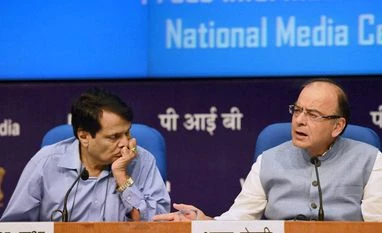It also cleared abolishing the classification of Plan and non-Plan expenditure in the Budget and agreed in-principle to advancing its presentation in Parliament from the last working day in February. The government wants the Finance Bill to be passed before April 1.
“The government is in favour of advancing the Budget date. However, a number of states are going to the polls early next year. We will take a call on a new date after studying the election calendar,” Finance Minister Arun Jaitley said at a press conference after the Cabinet meeting on Wednesday.
Uttarakhand, Manipur, Goa, Punjab and Uttar Pradesh are slated to go to the polls early next year.
Suresh Prabhu will be the last railway minister to have presented a Budget and Jaitley will be the first finance minister to present a combined one next year.
“India was the only country with a separate Railway Budget. We are breaking that tradition. However, the financial powers of the railways will stay. We will not have to pay a dividend of about Rs 10,000 crore annually. We will also be able to increase our capital spending,” Prabhu said, at the press briefing.
“There will be a separate discussion on the expenditure of the railways in Parliament every year, so that accountability remains,” Jaitley said. Issues like pension liabilities, dividend and gross budgetary support are yet to be decided. A call on these will be taken closer to the presentation of the Budget.
“Expenses of the railways are met by the carrier through its revenue. This practice will continue. Railway borrowings will continue to be government loans,” Economic Affairs Secretary Shaktikanta Das said.
The tradition of presenting a separate Railway Budget began in 1924 when expenditure on the railways was higher than general government spending. Now ministries like defence and highways spend more than the railways. A committee headed by NITI Aayog member Bibek Debroy had observed that a separate Railway Budget was a ritual because its size had shrunk compared to the General Budget.
At the end of the 12th Five-Year Plan on March 31, 2017, the government will also do away with Plan and non-Plan classification of expenditure and shift to a revenue and capital break-up. Additionally, centrally-sponsored schemes, which are now monitored on input, activity and output, will be also face scrutiny over outcome and impact.
The last time a major change took place in the presentation of the General Budget was when Yashwant Sinha tabled the 1999-2000 Budget at 11 am instead of 5 pm.
Sinha told a television channel advancing the date of presentation of the Budget could make calculation of the fiscal deficit difficult. The fiscal deficit and tax projections are based on advance estimates of the gross domestic product released on February 7-9.
“We should move away from the practice of certain indirect tax proposals coming into effect from June 1,” Jaitley said. Service tax is effective from June 1 but it will be subsumed into the goods and services tax that is likely to be rolled out on April 1, 2017.
Revenue Secretary Hasmukh Adhia said the government would issue the Budget circular in a day or two.
THE 5 RAIL BUDGET ‘MISSES’
- Railway minister will no longer deliver a speech
- There will be no fare-freight revision
- New rail lines and train services to be part of Union Budget
- Capital charge of Rs 2.27 cr to be wiped off
- Railways to no longer pay dividend
- Approval to merge Railway Budget with Union Budget
- In-principle approval to advance date of Budget presentation from last working day in February
- Nod to merge Plan and non-Plan expenditure. Shift to a revenue and capital break-up
- Replacing Planning Commission with NITI Aayog
- Amendment in the RBI Act to target inflation in the range of 2-6%
- Amendment in the RBI Act to have Monetary Policy Committee that will fix policy rate
- Change in delivery mechanism of subsidies and giving it legal backing via Aadhaar Act
- Change in GDP calculation methodology
- Change in the way fiscal deficit is presented. A possible change in Fiscal Responsibility and Budget Management Act. N K Singh heading a panel to review it
- Change in financial year. Shankar Acharya panel is examining its feasibility
- GST roll-out, targeted for April 1, 2017
“India was the only country with a separate Rail Budget. We are breaking tradition”
To read the full story, Subscribe Now at just Rs 249 a month
Already a subscriber? Log in
Subscribe To BS Premium
₹249
Renews automatically
₹1699₹1999
Opt for auto renewal and save Rs. 300 Renews automatically
₹1999
What you get on BS Premium?
-
Unlock 30+ premium stories daily hand-picked by our editors, across devices on browser and app.
-
Pick your 5 favourite companies, get a daily email with all news updates on them.
Full access to our intuitive epaper - clip, save, share articles from any device; newspaper archives from 2006.
Preferential invites to Business Standard events.
Curated newsletters on markets, personal finance, policy & politics, start-ups, technology, and more.
Need More Information - write to us at assist@bsmail.in
)